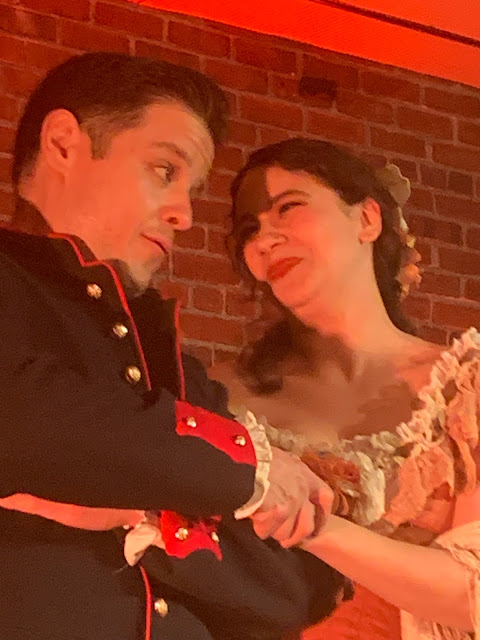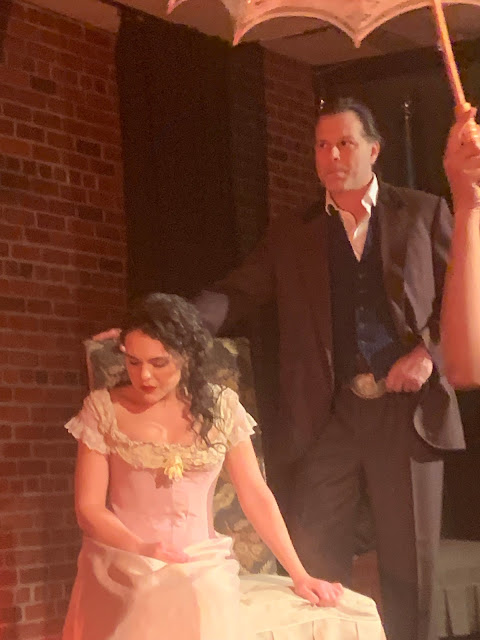MISSION
Sunday, April 30, 2023
FOXY AND FABULOUS
Wednesday, April 26, 2023
CYRANO DE BERGERAC
Monday, April 24, 2023
FERNANDA
Kelly Guerra and Marcelo Guzzo
Things have a way of coming full circle. It was Maestro Jorge Parodi who taught us everything we know about the art of zarzuela and launched our deep interest in this art form. And now several years have elapsed and it is Mo. Parodi who, having taken over the reins of Opera Hispanica as General and Artistic Director, brought one of our favorite zarzuelas to the stage! He has done so in an accessible fashion, emphasizing the gorgeous melodies of Federico Moreno Torroba's 1932 masterpiece Luisa Fernanda and omitting the confusing Republican versus Royalist politics of 1868 during the reign of Isabel II.
Although some day we would love to see the work produced in toto, for the time being we were more than satisfied to hear the memorable melodies sung by an excellent Panamerican cast, accompanied by Mo. Parodi himself at the piano, joined by violinist Mia Nardi-Huffman. We were delighted but not at all surprised that Mo. Parodi accomplished the excellent reduction of the lavish orchestral score.
Like many zarzuelas, the story of Luisa Fernanda is a combination of romantic issues and political ones. Poor Luisa, sensitively sung by Peruvian mezzo-soprano Kelly Guerra, is enamored of the dashing military man Javier, (dashingly performed by tenorific Mexican César Delgado) who happens to be a "player". He surprises everyone by falling for the Duchess Carolina (seductively sung by Puerto Rican soprano Laura Soto-Bayomi) and switching political affiliations. Meanwhile Luisa is being courted by the wealthy landowner Vidal (authoritatively performed by Uruguayan baritone Marcelo Guzzo) who switches his political affiliations to win Luisa's affection. What political turmoil there was in 1862 Spain, matched only by the characters' romantic turmoil! We are not going to tell you the romantic outcome.
By eliminating the dialogue and extraneous characters, Mo. Parodi allowed the audience at the Instituto Cervantes (a most appreciative audience, we might add) to focus on each character's emotional shifts, which are so well delineated by Torroba's music. No doubt, the melodies may sound as familiar to your ears as they did to ours and, be warned, may lead to an infestation of "ear worms". We have been humming the themes all day!
The work was performed with minimal set but authentic period costumes by Eric Lamp, lending an air of verisimilitude.
Mo. Parodi, himself an Argentinian, succeeded on so many levels, from adapting the score to finding an attractive quartet of gifted singers who had the right style and the acting chops to make us care about the characters.
Fortunately, the opera world has not seen the end of this gem, since it will be performed at Opera in Williamsburg on May 13th. We left with our appetite appeased but somehow a hunger for more. Let us hope that this project will be developed further.
© meche kroop
Friday, April 21, 2023
NEW CAMERATA OPERA GALA
Thursday, April 20, 2023
TWO OUT OF THREE WERE JUST RIGHT
We did not feel at all cheated experiencing two of the three operas conceived by Puccini as a trilogy. There was enough aural beauty that we left the Peter Jay Sharp theater on opening night feeling totally satisfied by a tight production of the tragic Suor Angelica and a rollicking production of the comedy Gianni Schicchi. Fortunately, we eschewed reading the program until after the production, allowing it to speak for itself. Having read John Giampietro's Director's Note, we think it valid to position both works as pleas for forgiveness and the achievement of moral redemption--valid, but rather a stretch and definitely unnecessary.
The gloomy grey setting used for both operas seemed more like a prison than a convent. The "Synopsis" tells us that this is a contemporary "community of holy women" but we know, dear reader, that this is a convent and it is not contemporary. Not having read the notes in advance, we just thought of it as a convent since the dialogue makes it perfectly clear with references to the Virgin Mary and penitence and obedience. Whatever those blue scarves the women were fooling with, they were easy to ignore in favor of focusing on the musical values. Bringing set elements up onstage by removing tiles in the floor was just plain silly.
But oh, those musical values! Maestro Daniela Candillari made the most of the resources at hand--the completely magnificent Juilliard Orchestra which we would prefer to listen to than to the NYPhilharmonic. Mo. Candillari brought out more layers in the score than we had heard heretofore and achieved perfect balance to the orchestral sections.
The singing was fine with the heavy lifting done by Deborah Love as Sister Angelica, delivering a moving "Senza Mamma" with passionate intensity. There was quite a contrast with the Zia Principessa of brilliant mezzo-soprano Natalie Lewis (whose arrival in a gilded coach was translated as "vehicle" to fool us into thinking of this as happening in the 21st century).
Only in fundamentalist Muslim cultures are women so badly punished for an out-of-wedlock child; if some daring opera company decides to pick up that ball and run with it, we will probably beg off!
Ms. Lewis' rich lower register and austere body language were most persuasive and the tense scene between punitive aunt and wayward niece was most affecting. We believe it is a far better decision to keep this story in its own time and place--one in which a prominent aristocratic family would have suffered great shame by an out-of-wedlock birth. The marriageability of Angelica's sister would have been a major concern in the late 17th c. and jeopardized by scandal.
The other nuns don't get much chance to sing and it is challenging to tell one from another but we found the sincerity of Song Hee Lee as the guileless Suor Genovieffe to be touching as she confessed to still having desires to pet a lamb as she did in her former life as a shepherdess. There was something very alive and believable about her performance.
The costumes surely resembled nun's habits although they were lilac in color. A jagged golden crack in the wall was meant to suggest a fountain that glimmered from the sun only 3 days of the year. It was not convincing.
Wednesday, April 5, 2023
SAFFRON AND DUKKAH
Rafael Aguirre and Fatma Said
A welcome departure from the typical voice/piano recital of German/French art songs brought a sell-out crowd to Weill Recital Hall last night. What could better suit a scintillating soprano in partnership with a master of the guitar than a program of songs originating in Spain-- with a sprinkling of Arabic and Sephardic songs to celebrate the mosaic nature of Spanish history.
Just as one could not visit Granada without appreciating the wonders of The Alhambra, one cannot listen to Spanish music without hearing the strains of Romani, Sephardic, and Arabic melodies and rhythms. A post-concert reading of Harry Haskells's scholarly program notes was most enlightening, tying together Spanish history and culture as they affected Spanish music.
But let us focus on what our ears told us! Celebrated and much recorded Egyptian soprano Fatma Said was the perfect choice for this music and her warm inviting manner drew us into her world. The instrument is crystalline and pure of tone and more than usually expressive. If there were one minor failing we noticed that the beginnings of some songs were a bit low in volume but by the second phrase had achieved suitable dynamics.
There were times when we wished for more specificity in the generous gestures which lost impact due to a lack of variety. For unknown reasons, Ms. Said kept her head tilted toward her wonderful guitar partner and frequently tilted her body in his direction. We felt like we had a critical parent voice in our head saying "Stand up straight!". This was a minor distraction and did not spoil the impact of her affection for the material and her generosity in sharing it.
The initial set was the one most familiar to us--Manuel de Falla's Siete canciones populares españolas, a cycle which we have mainly heard with piano accompaniment. Hearing it with guitar was a refreshing novelty. The varying moods came across well, although we missed the irony we like to hear in "El paño moruna" and "Seguidilla murciana", both of which are symbolic references to women of low morality. However "Asturiana" captured quiet sorrow in four brief lines. We enjoyed the earnest feelings of "Jota" and the rage of "Polo". The guitar introduction to "Nana", performed by Rafael Aguirre, set the stage for this moving lullaby.
We know the music of Joaquin Rodrigo primarily through his orchestral works-- Concierto de Aranjuez and Fantasia para un gentilhombre. This was our first exposure to one of his songs "Adela" from Tres canciones españolas which was marked by simplicity and opened with some lovely arpeggi in the guitar.
The most modern sounding set on the program was composed by Lorenzo Palomo and comprised a "Madrigal and Five Sephardic Songs" which bore the influence of the pre-expulsion Jewish presence in Spain. As we have noted before, Spanish composers, even those that studied in Europe, never succumbed to the anti-melodic influence of the 20th c. that so destroyed the art song tradition.
We enjoyed José Serrano's jaunty "La canción del olvido: Marinela" and Federico Garcia Lorca's similarly jaunty "Los cuatro muleros". In complete contrast was the emphatic "Sevillanas del siglo XVIII".
Perhaps our favorite canción was the romantic "Del cabello mas sutil" from Fernando Obradors' Canciones clasicas españolas. The song is short and sweet and we wished the composer had written another verse or two!
The Egyptian songs on the program represented the Arabic contribution to the Iberian musical landscape. We didn't find the harsh Arabic language to be any more singable than we find English to be; however, the warmth and sincerity endowed by Ms. Said made them compelling. Najib Hankash's "Give me a flute and sing" offered the opportunity to appreciate the artist's fine fioritura. Sherif Mohie El Din's "Will the River Flow Forever" was marked by a lovely spinning out of sound that seemed to last forever.
Mr. Aguirre had a chance to shine in his solo Gran Jota by Francisco Tárrega. This is a most virtuosic work, filled with pyrotechnics--dazzling finger work and astonishing percussive effects. We wished we had been sitting closer since we were trying to figure out how he managed to play melody, harmony, and percussion all at once.
We enjoyed the evening a great deal and we left wanting to hear Mr. Aguirre perform in Rodrigo's Concierto de Aranjuez someday. In the same fashion, we would love to experience Ms. Said on the opera stage. Her credits are mainly in the area of art song but we had some mental fun casting her in a number of operas featuring charming coquettish heroines!
© meche kroop






